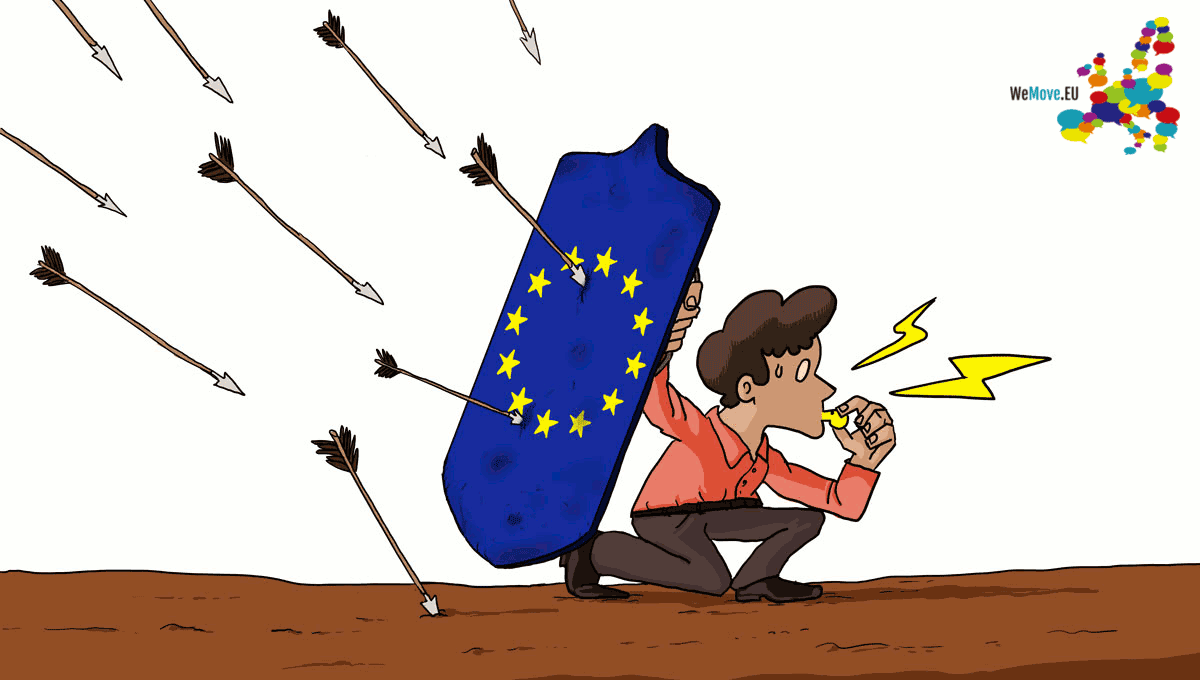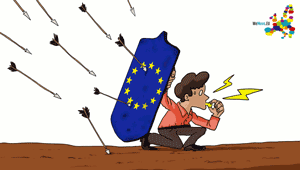
New petition on whistleblower protection
With a couple of months left to make sure that the EU whistleblower protection directive becomes a success Eurocadres and WeMove.EU launch a new petition to push for important improvements in the directive. Sign the petition here.
Trade Unions and NGOs are actively lobbying for changes in the whistleblower protection directive. A fundamental problem with the directive, which also remains in the newly adopted Council position, is the requirement to first report internally before being allowed to report to law enforcement and be protected. Removing this is one of the key demands in our petition.
–Not protecting whistleblowers unless they report to the specified whistleblower channel that the company has set up is a really bad idea. It will be safer to report to this internal channel rather than to your manager, which in many cases would be the normal procedure. Whistleblowers should be fully protected regardless of which channel they choose, says Martin Jefflén, President of Eurocadres.
Trade union demands
The directive is not clear on the right to seek advice from a trade union. The proposal from the Commission, and also the version from the Council, sets up a system with internal reporting – the dedicated channel inside the company/organisation, external reporting – to a competent authority or law enforcement agency and finally external reporting. In this three step system it is hard to see what the role of trade unions is.
–It is unacceptable to not ensure that people can seek advice from their trade union. Surely it can't be the intention that going to your trade union is the same as posting the information on social media. It must also be allowed to have the trade union represent you internally. This must be fixed, Martin Jefflén continues.
The petition can be signed here. Full text below.
Blow the whistle!
Petition to the European Council, Parliament and Commission
Whistleblowers in the EU must be protected
We call on you to agree on a strong whistleblower protection directive which includes
- the right to seek advice from trade unions and NGOs
- the right to be represented by a trade union
- the right to contact law enforcement directly
- safe disclosure to journalists
- safeguards for existing national whistleblower laws
- a broad whistleblower definition, with no extra test on how the reported information was acquired
Why is this important?
It is thanks to whistleblowers that the public found out about scandals like Lux-Leaks, the Panama and Paradise papers on tax evasion, Dieselgate on environment, as well as many scandals involving food safety, health and elderly care.
The fight for a strong protection for whistleblowers in the EU has been going on for many years. Trade unions and civil society have worked together with the European Parliament, demanding that the European Commission should act. After long and persistent lobbying and campaigning we finally got the European Commission to propose a directive on whistleblower protection in April 2018. While it marked a good starting point for discussions, improvements were clearly necessary. The European Parliament has improved the text and it is now up to their negotiations with the Council and Commission to agree on a good final text which should include the following:
- the right to seek advice from a trade union and/or NGO. The directive must guarantee the right to consult with a trade union and/or civil society organisation without losing the protection.
- the right to be represented by a trade union. Ensuring that a trade union can represent the whistleblower.
- the right to contact law enforcement directly. Whistleblowers must be able to report directly to law enforcement agencies and competent authorities without risking losing protection. Not allowing it could lead to destruction of evidence and cover-ups when those responsible are alerted by internal reports. In short, an obstruction of justice. This means that the so called mandatory internal reporting in the directive must be deleted.
- safe disclosure to journalists. Ensuring that whistleblowers safely can turn to journalists strengthens investigative journalism and is good for democracy.
- safeguards for existing national whistleblower laws. This means adding a “non-regression clause”, a clause which guarantees that the directive cannot be used as an excuse to worsen already existing whistleblower protection laws and procedures.
- a broad whistleblower definition, covering the likes of Antoine Deltour, LuxLeaks. This means that there should not be any extra test on how the information was acquired.


